Managing your business's finances doesn't have to come with a hefty price tag. A surprising number of powerful tools offer robust features without costing a dime, but with so many options, how do you choose the right one for your specific needs? This guide cuts through the noise to provide a detailed, hands-on breakdown of the 12 best free bookkeeping software solutions available today. We move beyond marketing claims to evaluate their true capabilities, hidden limitations, and ideal use cases.
Whether you are a freelancer just starting out, a small business owner managing inventory, or a growing company needing scalable, open-source power, this resource will help you make an informed decision. We provide a straightforward comparison of each platform, complete with direct links and screenshots to give you a clear view of the user experience.
Throughout this guide, we will explore the core functions of each tool, from invoicing and expense tracking to comprehensive financial reporting. We will also discuss how to handle common bookkeeping challenges, such as manually entering data from bank statement PDFs, and explain how complementary tools can perfect your financial workflow. Our goal is to equip you with the practical insights needed to select and implement the perfect software for your business, saving you time and money.
1. Wave Financial (Accounting by Wave)
Wave Financial offers one of the most robust and truly free bookkeeping software solutions available, making it an excellent starting point for freelancers, solopreneurs, and small service-based businesses. Its free "Starter" plan is not a limited-time trial; it provides core accounting functionalities like unlimited income and expense tracking, customizable invoicing, and essential financial reporting (e.g., Profit & Loss, Balance Sheet) at no cost. This makes it a standout choice for those needing professional tools without an initial investment.
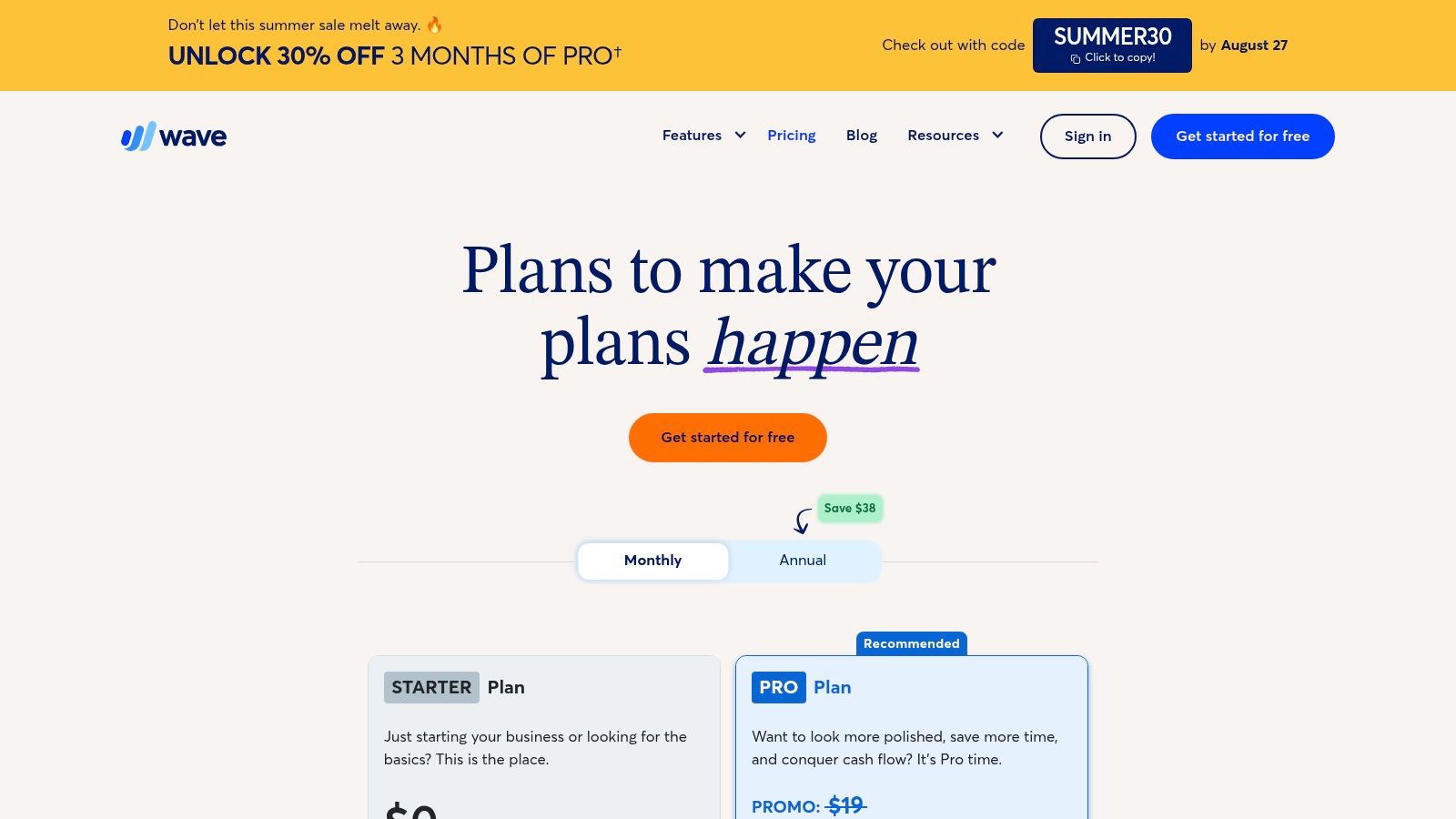
Core Features & Limitations
The platform's intuitive interface simplifies the process of sending invoices and managing bills. However, the free tier requires manual data entry. For automation, such as connecting your bank account for automatic transaction imports, you must upgrade to the paid "Pro" plan. This is a critical distinction; if you want to save time on data entry, the free version has its limits. Support is also reserved for paying customers, so free users rely on community forums and help centers.
- Best For: Freelancers and small businesses with simple accounting needs.
- Pros: Genuinely free plan for core accounting and invoicing, clean user interface.
- Cons: No automatic bank feeds or direct support on the free plan.
For more guidance on managing your finances effectively, check out these small business bookkeeping tips.
Website: https://www.waveapps.com/pricing
2. ZipBooks
ZipBooks offers another excellent option in the realm of free bookkeeping software, particularly for freelancers and small businesses looking for a clean interface with a clear upgrade path. Its free "Starter" plan is a permanent offering, providing unlimited invoicing, management of unlimited vendors and customers, and basic financial reporting. What sets it apart from many competitors at the free level is the ability to connect one bank account, allowing for easier transaction reconciliation without a paid subscription.
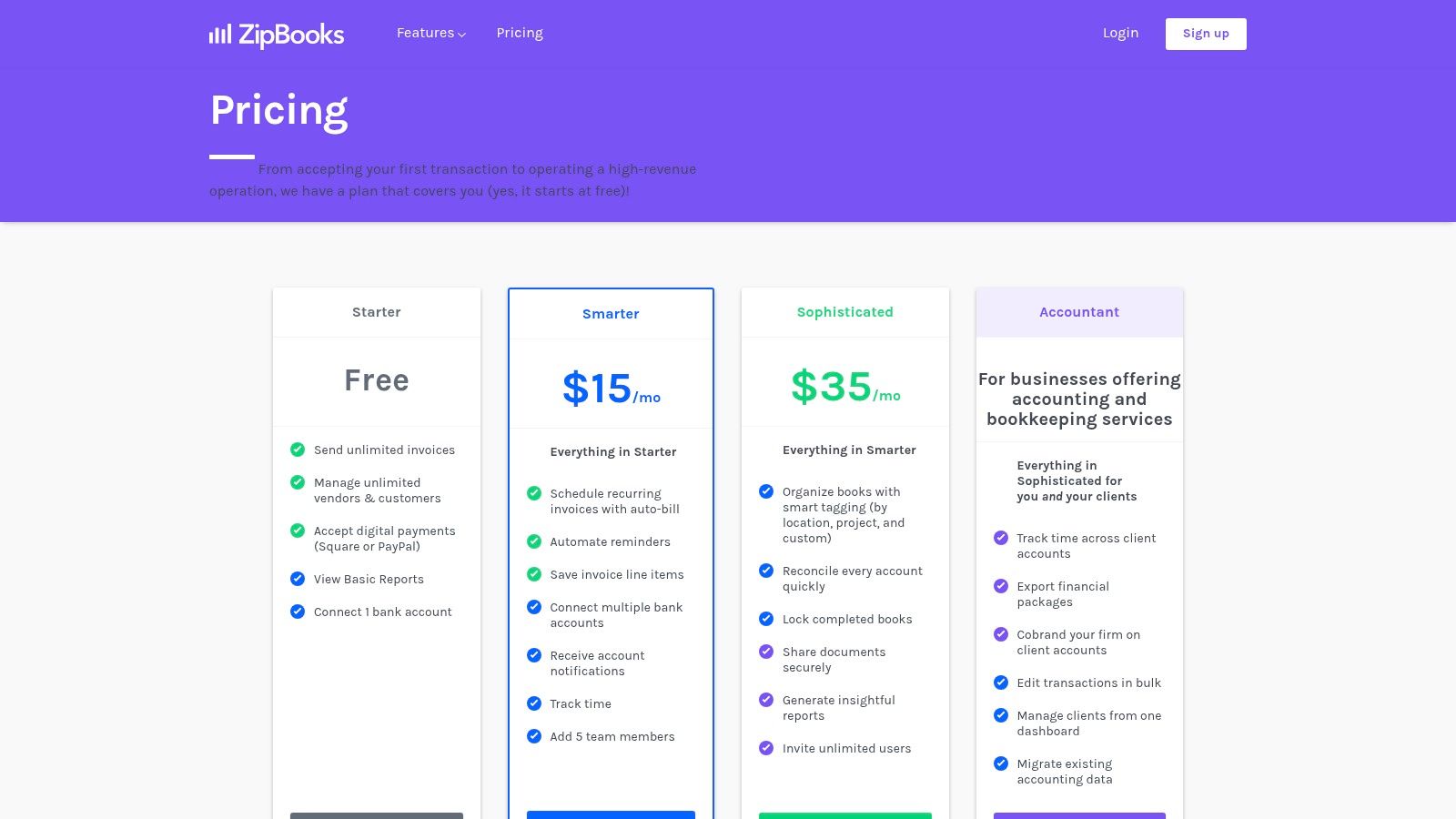
Core Features & Limitations
The platform excels at simplifying core accounting tasks. Users can create and send professional invoices and accept digital payments through Square and PayPal integrations directly within the free tier. However, the Starter plan's limitations become apparent for growing businesses. It only allows for one bank connection and offers only basic reports. For access to more advanced features like recurring invoices, time tracking, multiple bank connections, and more detailed reporting, you must upgrade to a paid plan.
- Best For: Small business owners and freelancers who need one bank connection and a simple, user-friendly invoicing system.
- Pros: Genuinely free plan with unlimited invoicing, includes one live bank feed, clean user interface.
- Cons: Advanced features and additional bank connections require a paid subscription.
Website: https://zipbooks.com/pricing/
3. Zoho Books
Zoho Books offers one of the most comprehensive free bookkeeping software plans on the market, ideal for small businesses that anticipate future growth. Its free tier is surprisingly robust, allowing a single user (plus an accountant) to manage finances, send up to 1,000 invoices annually, and accept online payments. This makes it a powerful choice for businesses needing a scalable solution that can grow with them, moving beyond basic entry-level tools without an immediate cost.
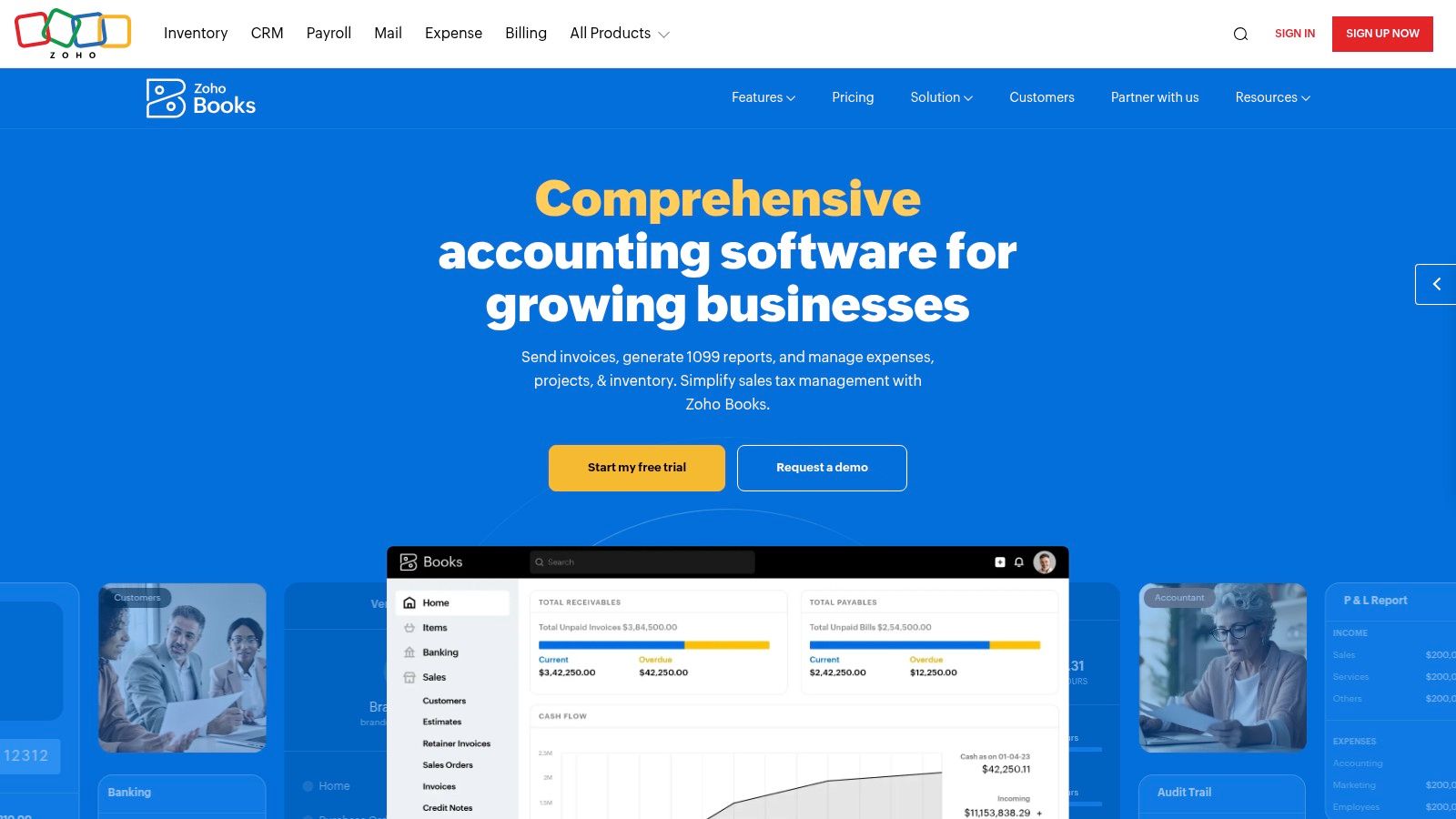
Core Features & Limitations
The free plan includes essential features like expense tracking, a client portal for customers to view invoices, and basic financial reports. Unlike many competitors, it also allows for integrations within the vast Zoho ecosystem, such as Zoho CRM or Zoho Inventory. However, the free version is limited to a single user and businesses under a certain annual revenue threshold (check Zoho's site for current figures). Advanced features like automated bank feeds and dedicated phone or chat support are reserved for paid tiers.
- Best For: Small businesses and startups needing a feature-rich, scalable accounting solution.
- Pros: Generous free plan with high invoice limit, strong integration capabilities, and excellent scalability.
- Cons: Single-user limit on the free plan; direct support is for paying customers only.
Integrating with the right accounting automation tools can further enhance the platform's capabilities.
Website: https://www.zoho.com/books/
4. GnuCash
GnuCash stands out as a powerful, open-source desktop application that offers a comprehensive suite of double-entry accounting tools completely free of charge. Unlike cloud-based SaaS products, it is installed directly on your Windows, macOS, or Linux computer, giving you total control over your financial data without ongoing subscription fees. This makes it an excellent choice for small businesses, nonprofits, and individuals who prioritize data privacy and robust, offline functionality over the convenience of a web-based interface.
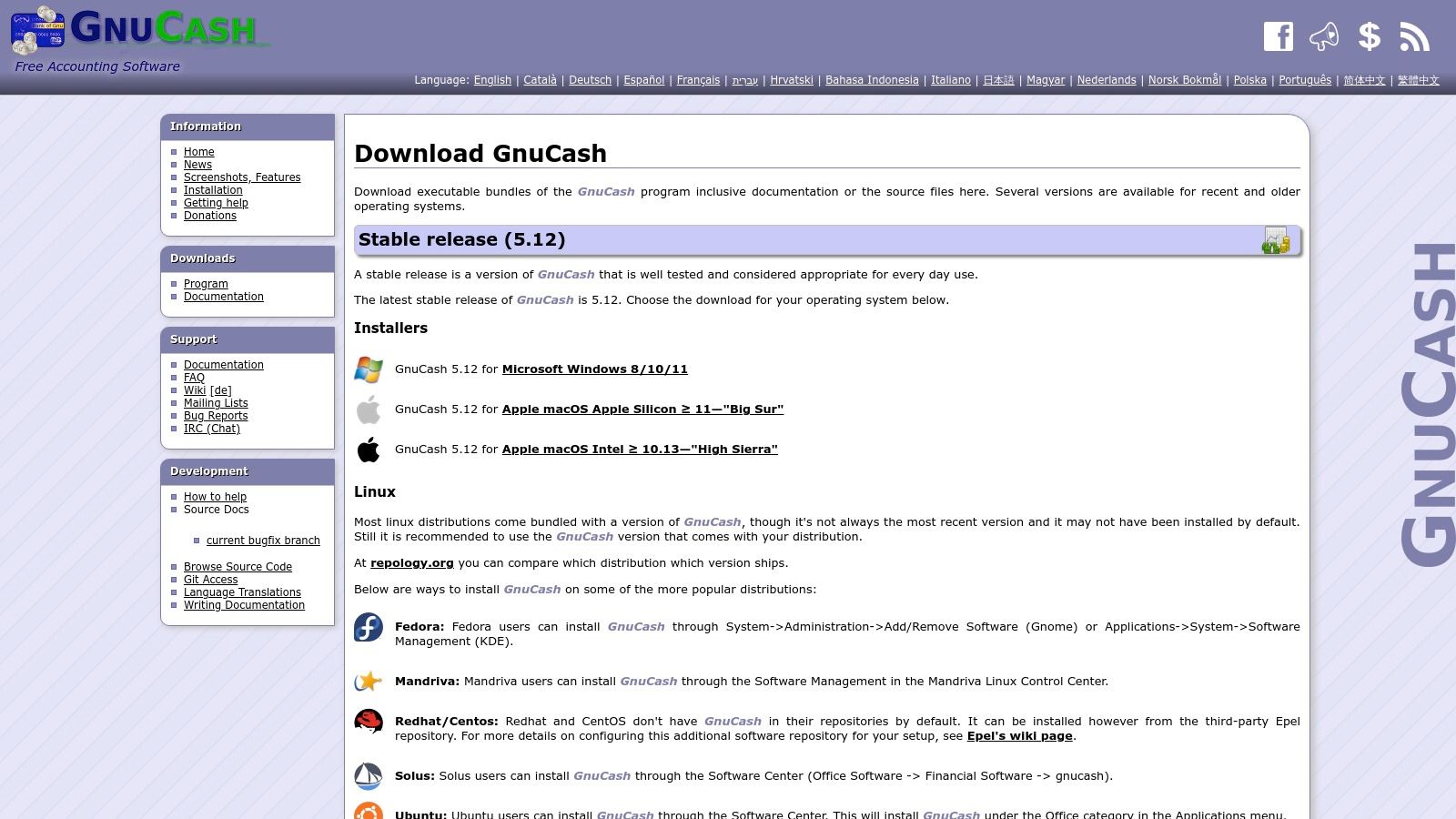
Core Features & Limitations
The software provides extensive features often found in paid alternatives, including accounts payable and receivable, invoicing, budgeting, and scheduled transactions. Its reporting capabilities are particularly strong, allowing for deep financial analysis. However, its strength as a desktop tool is also its main limitation; there are no native cloud or mobile apps for on-the-go access. The user interface, while powerful, has a steeper learning curve compared to more modern, streamlined cloud software, which may be a challenge for beginners.
- Best For: Small businesses and nonprofits needing detailed, traditional accounting on a desktop.
- Pros: Completely free with no data limits, powerful reporting, and full offline data control.
- Cons: Steeper learning curve and no native cloud or mobile applications for remote access.
Website: https://www.gnucash.org/download
5. Manager.io
Manager.io stands out by offering a powerful, fully-featured desktop edition that is completely free forever, with no limitations on features or usage. This makes it an exceptional piece of free bookkeeping software for businesses that need comprehensive accounting tools, such as fixed asset and inventory tracking, without the monthly subscription fees. It’s designed for those who prefer to manage their financial data locally on a single computer and don't require cloud-based collaboration.
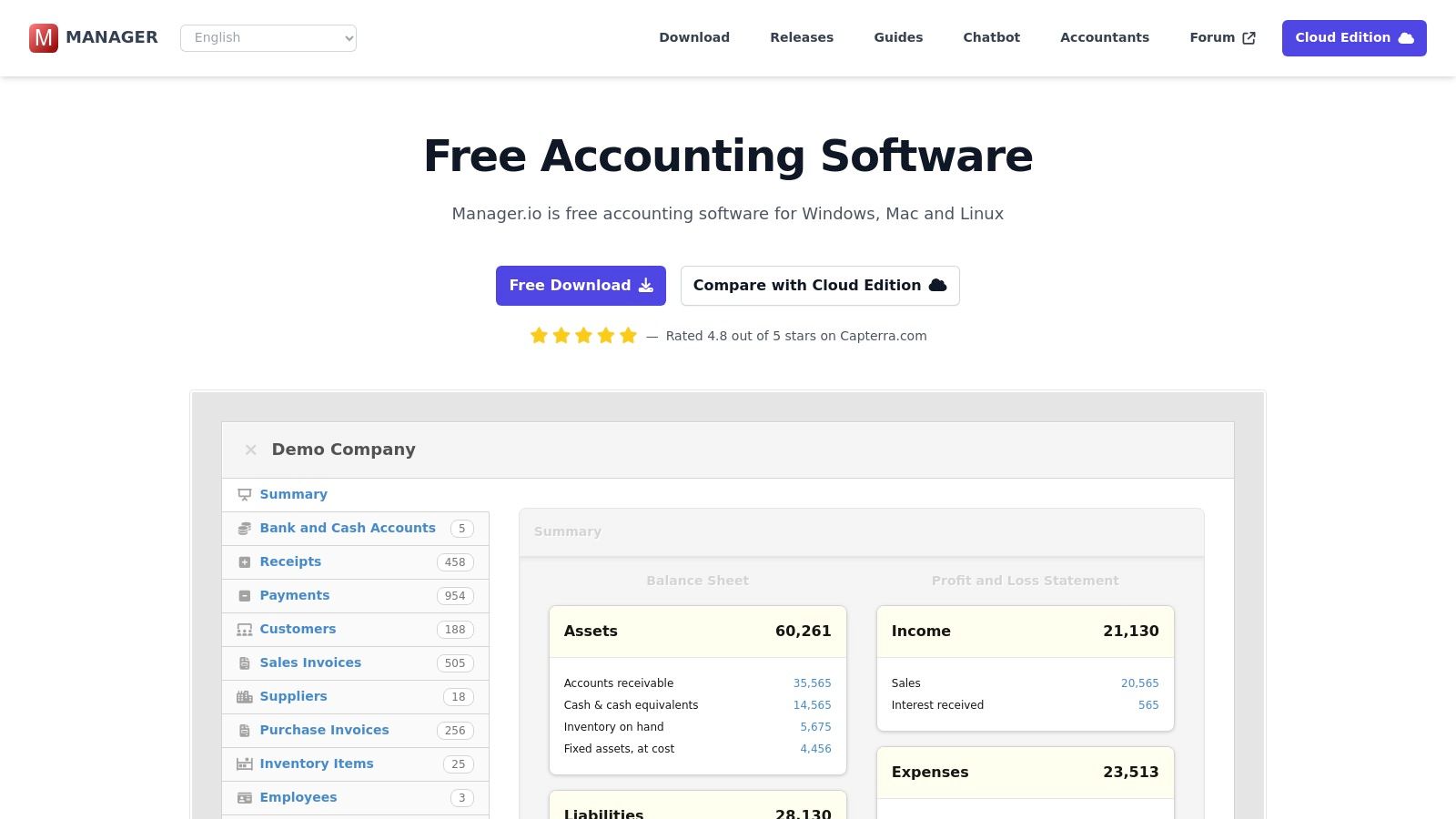
Core Features & Limitations
The free desktop version includes a robust double-entry ledger, accounts receivable/payable, and sophisticated financial reporting capabilities. While the software is incredibly comprehensive for a free tool, its primary limitation is the lack of built-in remote access or multi-user support; these features are reserved for the paid Cloud and Server editions. This makes the free version ideal for a single user or a business where all accounting is handled from one workstation. Migrating from the free desktop version to a paid plan is seamless if your needs grow.
- Best For: Small to medium-sized businesses that need detailed accounting features and prefer offline software.
- Pros: Genuinely free desktop version with full features, no per-user fees on paid cloud plans.
- Cons: Free version is for single-user, offline access only; no cloud functionality.
For businesses looking to streamline their financial processes, understanding the benefits of automated bank reconciliation software can be a significant advantage.
Website: https://www.manager.io
6. Akaunting
Akaunting offers a modern approach to bookkeeping with a unique US-specific free tier designed for small businesses getting started. Unlike completely unlimited free plans, Akaunting’s free option provides a taste of premium features, including a limited number of invoices, bills, and one bank connection. This makes it a great choice for businesses that want to test a full-featured system without immediate commitment, with the added benefit of being open-source for those who prefer a self-hosted solution.
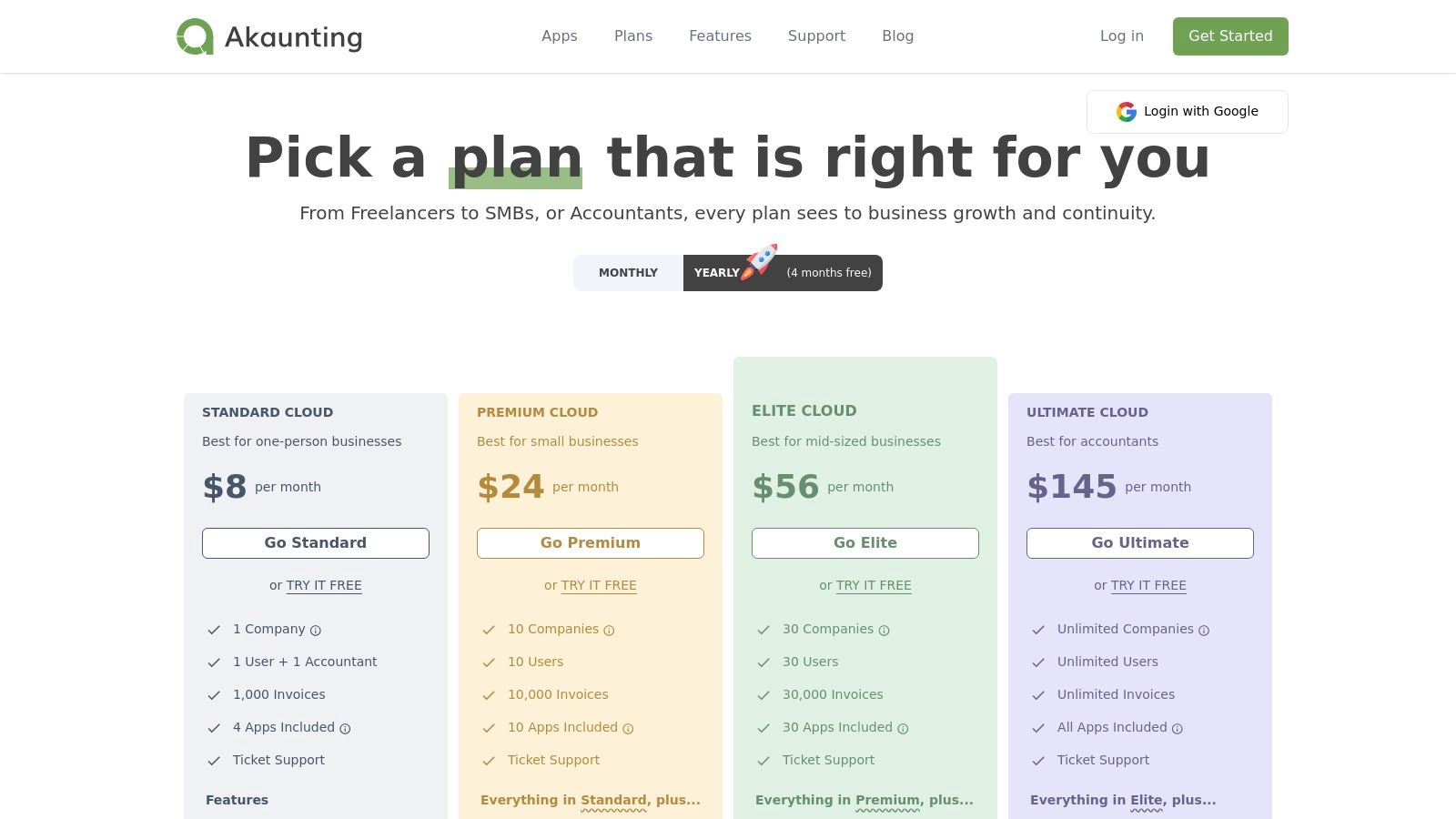
Core Features & Limitations
The free plan includes support for crucial US tax forms like W-9s and 1099s, which is a significant advantage for businesses working with contractors. However, its limitations are strict: you can only create 20 invoices and 5 bills and connect a single bank account. This model pushes growing businesses toward paid plans quickly. The true value lies in its scalability, offering advanced features and an app marketplace for those who choose to upgrade, making it one of the more flexible free bookkeeping software options for future growth.
- Best For: Small US businesses and freelancers needing basic tax form support and a scalable platform.
- Pros: True $0 entry with useful US tax features, open-source option available, scales to advanced features.
- Cons: Free tier has very strict caps on invoices, bills, and bank connections.
Website: https://akaunting.com/plans-us
7. Odoo Accounting
Odoo Accounting stands out as a powerful component of a larger, modular business management ecosystem. Its unique offering is the "One App Free" plan, which allows unlimited users to access the full-featured accounting application at no cost. This makes it an incredibly scalable free bookkeeping software solution for growing teams or organizations that anticipate needing more integrated business tools in the future. The plan provides a comprehensive suite of tools, including double-entry bookkeeping, invoicing, bank reconciliation, and robust reporting.
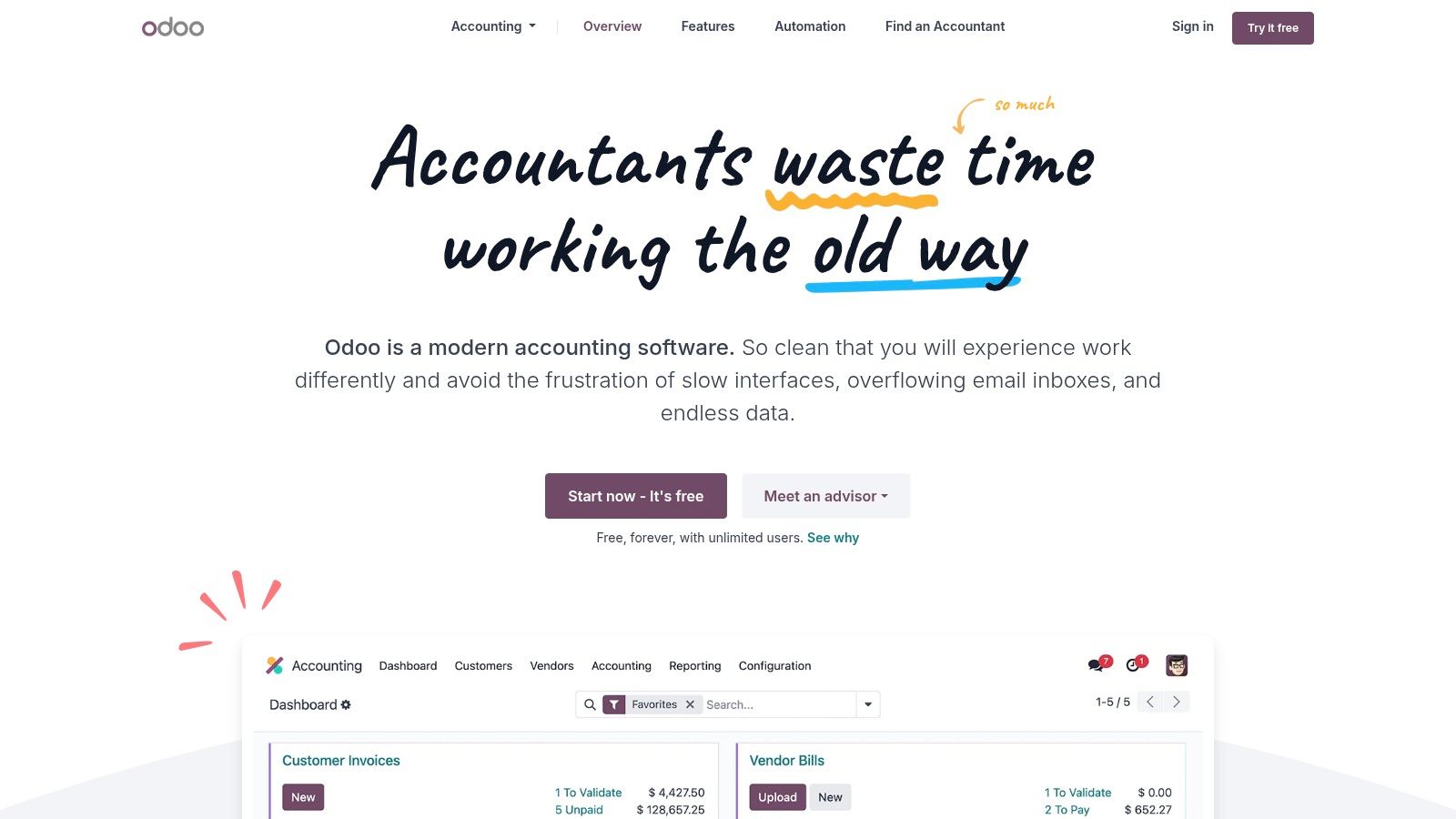
Core Features & Limitations
The strength of Odoo lies in its integration capabilities. While the accounting app is free, it’s designed to work seamlessly with Odoo’s other apps like CRM, inventory, and project management. However, this is also its primary limitation; adding any other app to your subscription moves you onto a paid plan. The free version is potent for pure accounting but lacks the broader ERP functionality unless you upgrade. Advanced features like API access and deeper customization are also locked behind paid tiers.
- Best For: Growing businesses that may need an all-in-one ERP system in the future.
- Pros: Truly free for unlimited users (one app), strong global tax localization, integrates with other Odoo apps.
- Cons: Becomes a paid service the moment you add a second Odoo app.
Website: https://www.odoo.com/app/accounting
8. ERPNext
ERPNext stands out as a powerful open-source Enterprise Resource Planning (ERP) system that includes a comprehensive accounting module, making it one of the most feature-rich options for those seeking the best free bookkeeping software. Unlike many competitors, its free version is not a stripped-down tier but the full software, which businesses can self-host without licensing fees. This approach is ideal for growing companies that need an integrated solution covering everything from accounting and inventory to HR and project management.
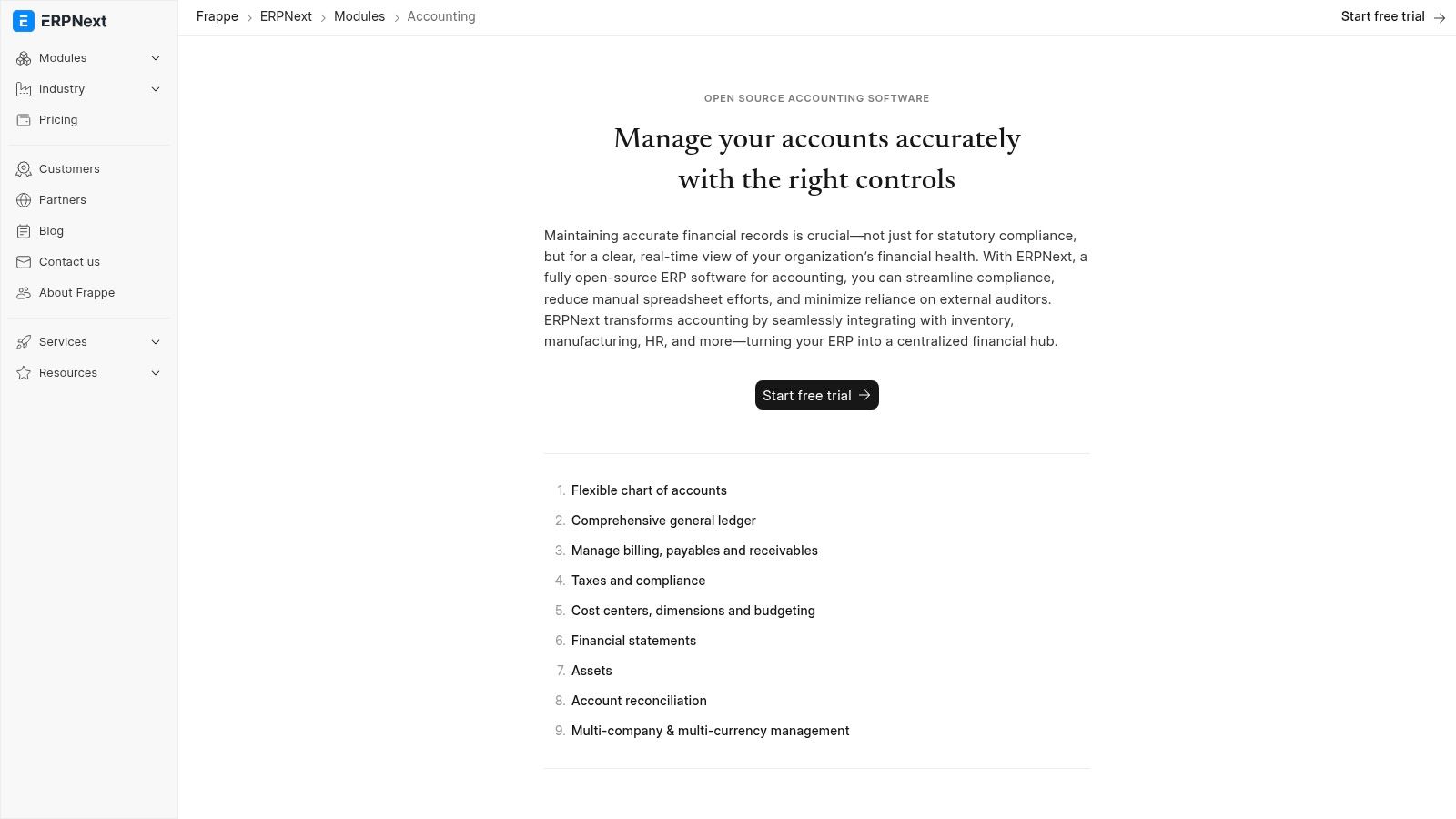
Core Features & Limitations
The platform includes a general ledger, accounts payable/receivable, bank reconciliation, and multi-currency support. However, its greatest strength is also its main challenge. The self-hosted model requires technical expertise to set up and maintain, and the user interface can feel complex for those only needing simple bookkeeping. While there is an active community for support, dedicated customer service is reserved for users of the paid, hosted cloud version. The extensive reporting features are a significant advantage for data-driven businesses.
- Best For: Tech-savvy small to medium-sized businesses needing a scalable, all-in-one ERP system.
- Pros: Completely free when self-hosted, extensive ERP features beyond accounting, strong community support.
- Cons: Requires technical knowledge for setup, and the interface can be overwhelming for simple needs.
To explore how ERPNext's reporting capabilities compare with other tools, see this guide to the best financial reporting software.
Website: https://frappe.io/erpnext/open-source-accounting
9. Dolibarr ERP/CRM
Dolibarr offers a unique approach in the world of free bookkeeping software by functioning as a modular, open-source ERP and CRM system. Instead of a pre-packaged solution, users can download the core software for free and enable only the modules they need, such as invoicing, banking, bookkeeping, and inventory management. This makes it a highly customizable and scalable option, especially for businesses with technical expertise that want to self-host and control their own data without recurring fees.
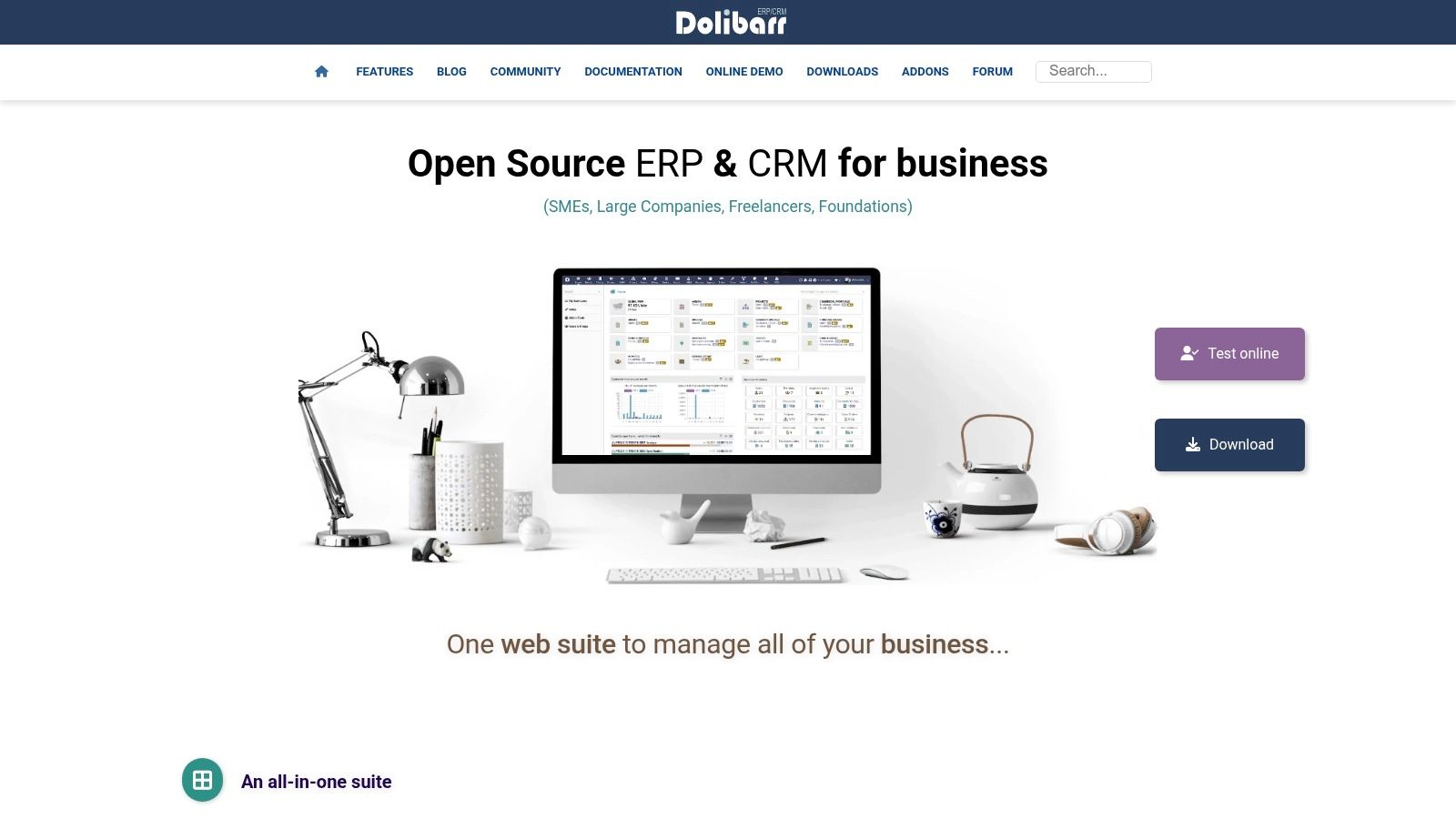
Core Features & Limitations
The primary strength of Dolibarr is its flexibility; you can build a system tailored to your exact needs. However, this flexibility comes at the cost of simplicity. The initial setup requires technical knowledge to configure the software on your own server or opt for a paid cloud hosting partner. While core modules are robust, more advanced or localized features, like specific US tax or payroll integrations, often rely on community-developed add-ons from its marketplace, which can vary in quality and support.
- Best For: Tech-savvy small to medium-sized businesses needing an integrated ERP/CRM and accounting solution.
- Pros: Completely free to download and self-host, highly modular and customizable, strong community support.
- Cons: Requires technical skill for setup and maintenance, and key features may depend on third-party add-ons.
Website: https://www.dolibarr.org/
10. LedgerSMB
LedgerSMB is a powerful, open-source accounting and light ERP system designed for small to medium-sized businesses that require robust, auditable financial controls. As a completely free bookkeeping software, its strength lies in its double-entry accounting core and its reliance on a PostgreSQL database, which ensures high data integrity. This makes it a fantastic option for businesses with the technical know-how to host their own software and who prioritize accounting correctness and control over a slick, cloud-based user interface.
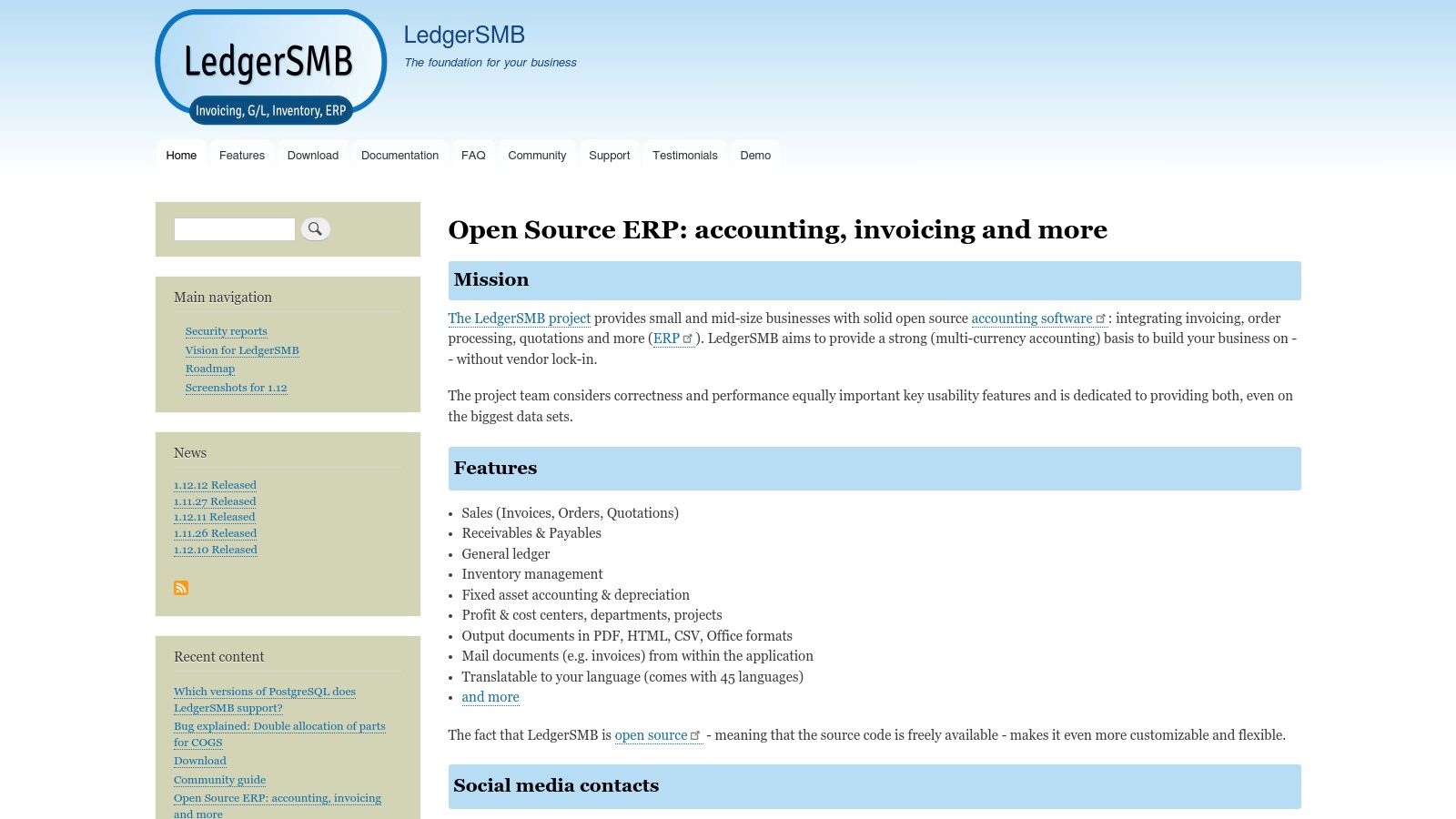
Core Features & Limitations
The platform offers a comprehensive suite of features, including general ledger, accounts receivable/payable, inventory management, fixed assets, and multi-currency support, all without licensing fees. However, its primary drawback is the setup complexity. Unlike turnkey SaaS solutions, LedgerSMB requires you to set up and manage your own server, which involves a significant technical learning curve. This self-hosted model gives you complete control over your data but means you are also responsible for maintenance, backups, and security.
- Best For: Technically proficient SMBs that need an auditable, self-hosted accounting system.
- Pros: Entirely free with no licensing fees, strong focus on data integrity and audit trails.
- Cons: Requires server setup and administration, has a steep learning curve.
Website: https://ledgersmb.org/
11. NCH Express Accounts
NCH Express Accounts offers a unique proposition as a downloadable, desktop-based solution, making it one of the best free bookkeeping software options for those who prefer offline data control. Its free edition is designed for small businesses with fewer than five employees, providing essential functionalities without a subscription. It delivers reliable tools for invoicing, managing accounts receivable and payable, and performing bank reconciliations, all from the security of your local Windows PC.
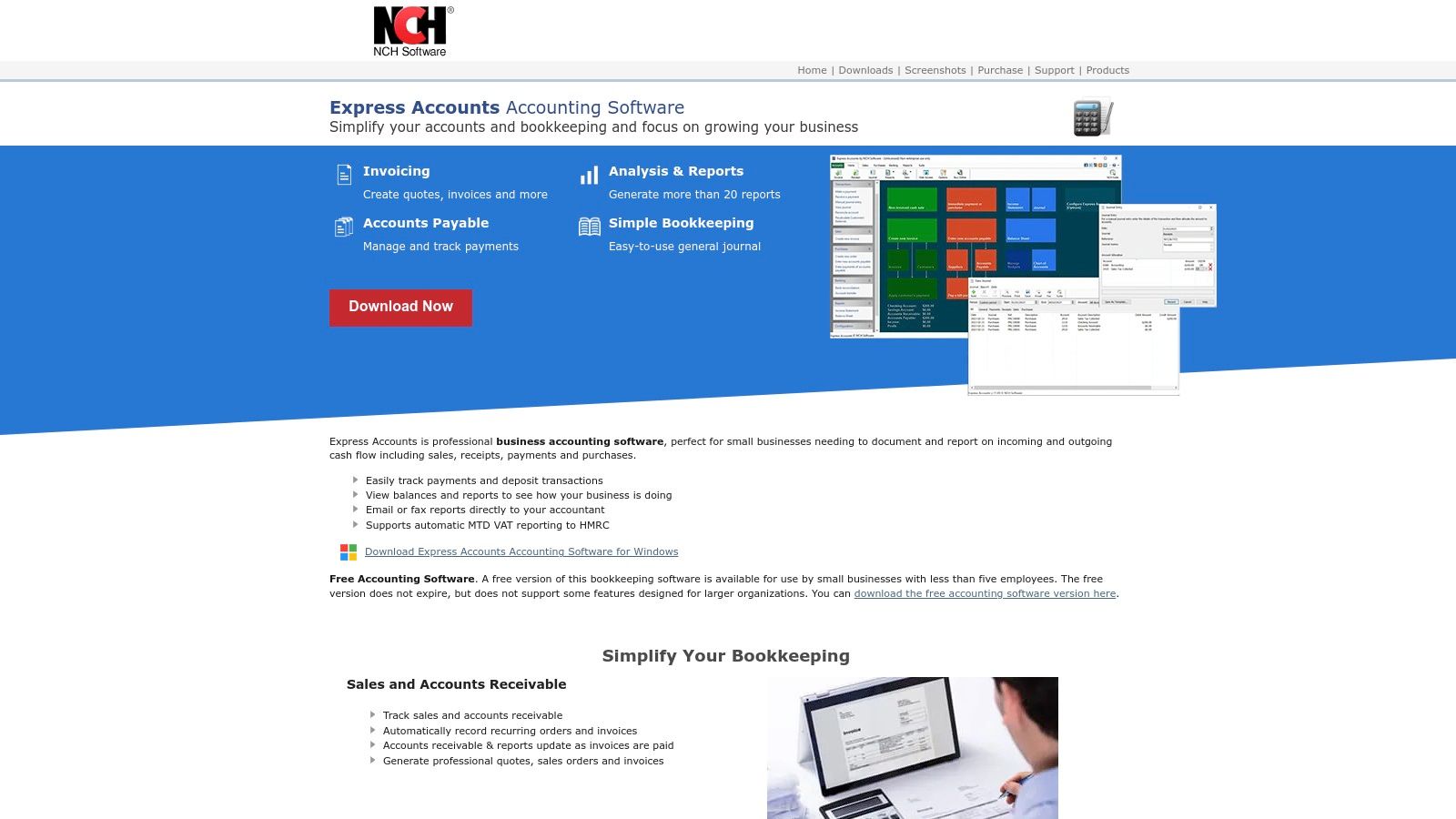
Core Features & Limitations
The software is straightforward, making it easy to generate quotes and invoices or track payments. A key benefit is its ability to run efficiently on older or lower-specification computers, which is a major advantage over resource-intensive web apps. However, this focus on a simple, local experience means the interface can feel dated compared to modern cloud platforms. It's also a Windows-centric program, so Mac and Linux users will need to look elsewhere. The free version has its limitations and will prompt users to upgrade if their business grows beyond the small-scale threshold.
- Best For: Windows users and small businesses who prioritize offline data access.
- Pros: Runs on older PCs, complete offline data control, straightforward core features.
- Cons: Dated interface, Windows-only, free version has employee-count limitations.
Website: https://www.nchsoftware.com/accounting/
12. Capterra (Comparison Marketplace)
Capterra isn't a bookkeeping software itself but a comprehensive marketplace that helps you discover the best free bookkeeping software available. It serves as a powerful research tool, allowing users to filter an extensive directory of accounting tools to find genuinely free options. By aggregating user reviews, feature lists, and pricing snapshots, it provides a one-stop-shop for comparing different platforms, saving you hours of individual research time when searching for a no-cost solution that fits your specific business needs.
Core Features & Limitations
The platform's strength lies in its "free" filter and side-by-side comparison tables, which offer a clear overview of what each software provides. Verified user reviews and ratings give you real-world insights into a tool's usability and customer support quality. However, a key limitation is that some listings might be limited-time free trials rather than perpetually free plans, so users must carefully verify the details on the vendor's site. There is also the potential for affiliate bias in how software is ranked or recommended.
- Best For: Business owners conducting initial research to compare multiple free software options.
- Pros: Quickly find and compare numerous free bookkeeping tools, real-user reviews provide valuable insight.
- Cons: Some listings may be free trials instead of truly free plans, potential for biased placement.
When you've chosen a tool, remember that many free options lack automated statement imports. You can use a service like Bank Statement Convert PDF to digitize paper statements for easy manual upload.
Website: https://www.capterra.com/accounting-software/s/free/
Top 12 Free Bookkeeping Software Comparison
| Software | Core Features / Characteristics | User Experience / Quality ★★★★☆ | Value Proposition 💰 | Target Audience 👥 | Unique Selling Points ✨ | Price Points 💰 |
|---|---|---|---|---|---|---|
| Wave Financial | Unlimited invoices, basic reports, mobile invoicing | Easy UI, integrated payments ★★★★☆ | True free tier, paid Pro for automation | Freelancers, very small biz | Free Starter, payment add-ons | Free Starter, Pro paid |
| ZipBooks | Unlimited invoicing, 1 bank feed free, PayPal/Square payments | Clean UI, upgrade path ★★★★☆ | Free core bookkeeping, easy upgrades | Small businesses | Unlimited invoicing free | Free Starter, paid tiers |
| Zoho Books | 1,000 invoices/yr, expense tracking, client portal | Robust features in free tier ★★★★☆ | Scalable plans, strong Zoho integration | Small businesses | Strong integrations, scalable tiers | Free single user, paid upgrades |
| GnuCash | AR/AP, budgeting, multi-currency, extensive reports | Powerful offline, steeper learning ★★★☆☆ | Completely free, offline control | SMBs, nonprofits | Open-source, full data control offline | Completely free |
| Manager.io | Double-entry ledger, AR/AP, fixed assets, inventory | Easy desktop use, flat cloud fees ★★★★☆ | Free desktop, affordable cloud/server | SMBs needing local & remote | Free unlimited desktop use | Free desktop, paid cloud/server |
| Akaunting | Invoicing, bills, bank connections, US tax forms | Modern UI with US tax features ★★★☆☆ | True $0 US tier, scalable paid plans | US small businesses | US tax forms included | Free capped, paid upgrades |
| Odoo Accounting | Double-entry, invoicing, bank reconciliation | Seamless Odoo app integration ★★★★☆ | Free unlimited users app in ERP ecosystem | Businesses in Odoo ecosystem | Free unlimited users, ERP modularity | Free app, paid addons |
| ERPNext | General ledger, AR/AP, multi-company, budgeting | Broad ERP, active dev ★★★☆☆☆ | Open source, no license self-host | SMBs needing ERP + accounting | Broad ERP features, active community | Free self-host, paid cloud |
| Dolibarr ERP/CRM | Invoicing, banking, modules, add-ons marketplace | Highly modular, flexible deployment ★★★☆☆ | Free download, customizable | SMBs needing modular ERP | Modular open-source with cloud option | Free OSS, paid SaaS partners |
| LedgerSMB | General ledger, AR/AP, inventory, audit controls | Secure data, focused on accuracy ★★★☆☆ | No licensing fees, strong audit focus | SMBs requiring auditability | PostgreSQL backend, audit focus | Completely free |
| NCH Express Accounts | Invoicing, AR/AP, bank reconciliation | Simple, offline, dated UI ★★★☆☆ | Free edition for small firms | Very small firms | Runs on low-spec PCs | Free limited, paid upgrades |
| Capterra (Marketplace) | Filter free software, user reviews, pricing comparisons | User-driven insights ★★★★☆ | Helps find free bookkeeping software | All business sizes | Curated marketplace with real-user reviews | Free to use |
Final Thoughts
Navigating the landscape of free bookkeeping software can feel overwhelming, but as we've explored, a zero-dollar price tag doesn't equate to zero value. The key takeaway is that the best free bookkeeping software is not a one-size-fits-all solution; it's the one that most closely aligns with your specific business model, technical comfort, and future growth trajectory.
From the user-friendly, cloud-based simplicity of Wave and ZipBooks, ideal for freelancers and small service businesses, to the robust, open-source power of GnuCash, Manager.io, and the comprehensive ERP systems like Odoo and ERPNext, the options are vast. Your decision hinges on a clear understanding of your operational needs. A solopreneur's requirements are vastly different from those of a small non-profit or a growing e-commerce store that needs inventory management.
Making Your Final Decision
Before you commit, revisit your core requirements. Ask yourself these critical questions:
- What is my primary business need? Is it simple invoicing, detailed expense tracking, project-based accounting, or comprehensive financial reporting for grant applications?
- How much am I willing to learn? Are you looking for a plug-and-play solution like Wave, or are you comfortable with the learning curve associated with a powerful open-source platform like GnuCash or LedgerSMB?
- What does my future look like? Consider scalability. A tool like Zoho Books offers a clear upgrade path, while a self-hosted solution like Akaunting provides ultimate control as you grow, provided you have the technical resources.
Implementation and Beyond
Once you've made a choice, implementation is your next critical step. Remember that even the best software is only as good as the data you put into it. Start with a clean slate by gathering all your financial documents, including bank statements, receipts, and invoices. This is where manual data entry can become a significant bottleneck.
The initial setup is your chance to establish good financial habits. Take the time to properly categorize your transactions and connect your bank accounts where possible. This diligence upfront will pay dividends, providing you with accurate, actionable insights into your business's financial health and making tax time significantly less stressful. Ultimately, embracing one of these tools is a foundational step toward gaining financial clarity and empowering your business to thrive.
No matter which free bookkeeping software you choose, you'll inevitably face the challenge of importing historical data from non-digital sources. Streamline this process with Bank Statement Convert PDF, a specialized tool designed to accurately convert your PDF bank statements into Excel (XLSX) or CSV formats. Skip the tedious manual data entry and get your new system populated with clean, ready-to-import data by visiting Bank Statement Convert PDF today.


